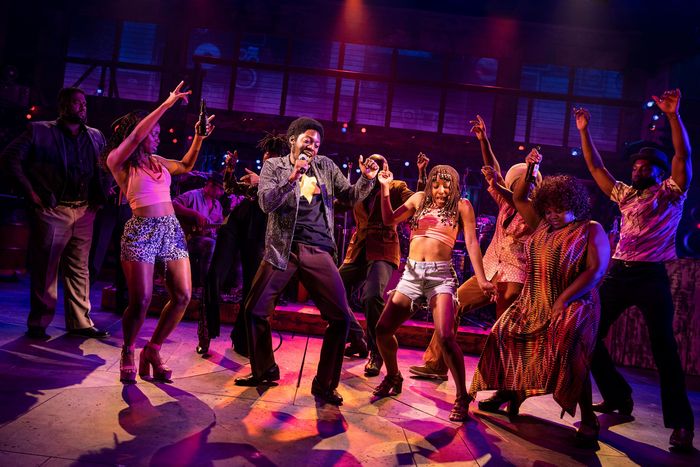
From the outside, The Harder They Come looks like a film that’s been sitting around waiting to be made into a good musical. The 1972 Jamaican cult hit, starring Jimmy Cliff and directed by Perry Henzell, came with a soundtrack full of reggae, most of it performed by Cliff himself, that popularized the genre in America. That means that any adaptation starts with a bevy of hits ready to weave together, starting with the title song and “You Can Get It If You Really Want.” Plus it has the sort of picaresque plot — young man comes to Kingston from the country and tries to find his way in the big city — that suits a book musical. A British team took a shot at making a Harder They Come musical in 2008, a seemingly winking take on the movie that referred to intermission as a “ganja break.” The Public Theater’s adaptation takes the film’s subject and setting a lot more seriously, so much so that its creators struggle to stuff in everything they want to comment on, modify, and underline from the original, alongside all the hit songs. This show makes the appeal of the film all the more obvious, even as it also proves how sneakily difficult it is to adapt.
This The Harder They Come, with a book and some new songs by playwright Suzan-Lori Parks, follows the contours of the film pretty closely, though it rearranges the relationships around the central character. Ivan, named after Ivanhoe and played by a winsome Natey Jones, comes to Kingston with a dream of making it in the music industry, but falls into petty crime along the way. This time, there’s a love story built out between him and Elsa (played by the singer Meecah), the young woman he falls for, supplying a conscience to ballast his more questionable actions. Like many film-to-stage female love interests, she ends up feeling halfway there, with more to say but not much more to do. She comments on what Ivan is doing, and her expanded dialogue lets Parks link his troubles with authority with a larger sense of class struggle, but she as a person remains static.
Speaking of those troubles with authority: Ivan falls for Elsa while working for a controlling preacher, played by a delightfully slimy J. Bernard Calloway. Later on, he also has run-ins with the payola-clutching music producer Hilton (I saw the understudy Garfield Hammonds, also delightfully slimy, in the role). The show has a real bounty of powerful sleazeballs, which is both part of the social critique and a storytelling problem. The first act stretches long, covering Ivan’s encounter with the Holy Redeemer Church as well as his first unsuccessful efforts to make it big with a song of his own (“The Harder They Come”), and his run-ins with both the Preacher and Hilton have a similar rhythm: Don’t trust men in power; a reminder, don’t trust men in power. By the time Act Two gets into the business of the ganja trade, run by the just-as-slimy kingpin Jose (Dominique Johnson), you know how it’s going to go. That, at least, leads to Ivan’s transformation from criminal on the run to local hero, delivering a chase-sequence that brings everything to a head. Yet the build toward that climax starts only late in the show, and it ends quickly. It would have been wise to spend more time with Ivan on the run and less with his roaming beforehand.
Those are beats from the film, written by Henzell and playwright Trevor Rhone, which was written and shaped on the fly as the crew captured near-documentary-style footage of Kingston in the 1970s. Onstage, director Tony Taccone and co-director Sergio Trujillo try to replicate the movie’s vérité feeling by staging big crowd scenes onstage, setting the cast milling around the city on a pair of turntables. The choreography, by Edgar Godineaux, gets those crowds gyrating to Cliff’s music, as performers playing everything from evangelists to farmers, all caught up in song. The enthusiasm overflows from the too-small stage, crammed with their bodies. You almost hope that they’ll stop moving just so that you can enjoy the tableau. In one scene, Ivan and Elsa are among the choir singing “Just a Closer Walk With Thee,” strip off their robes midway and grind as if in a dancehall, and then slip back into the robes for the ending. It’s a bravura moment that passes by too quickly.
The montage-like speediness pervades The Harder They Come, which tries so hard to expand on the film in so many ways that it starts to squeeze out the most appealing part of all: the music. In the first act alone, the program includes 23 musical numbers. The cast’s voices sound uniformly strong (and often acrobatic) and they get the audience going whenever they arrive at a familiar hook — but with so much to cover, the musical offers only fragments of each. Most scenes move on after only a verse or two. Watching the cast perform “I Can See Clearly Now” at the top of Act Two, staged on the ganja farm with reference to the mind-expanding possibilities of THC, I wanted the musical to take its own implicit advice and relax a little. This will all be clearer if you just pause a second and maybe take a toke.
The Harder They Come is at the Public Theater through April 2.





